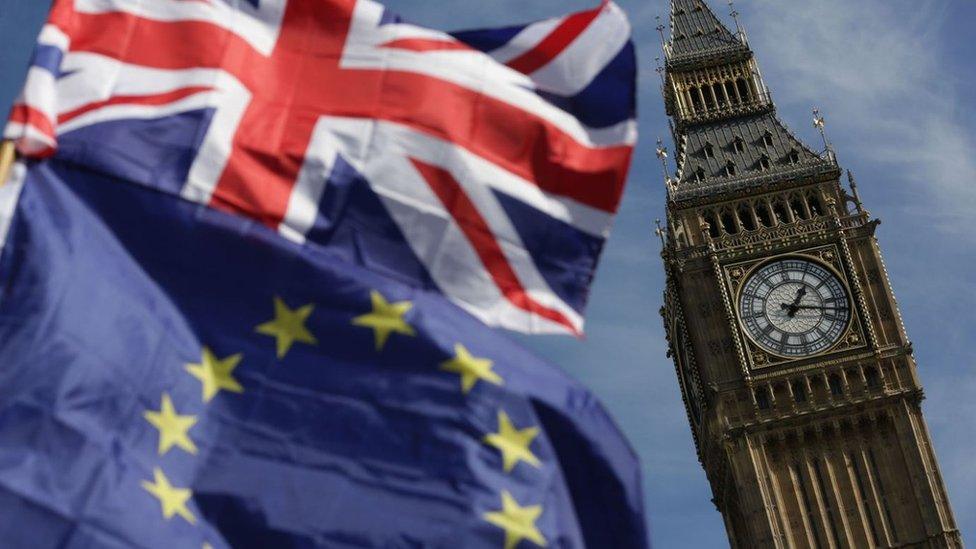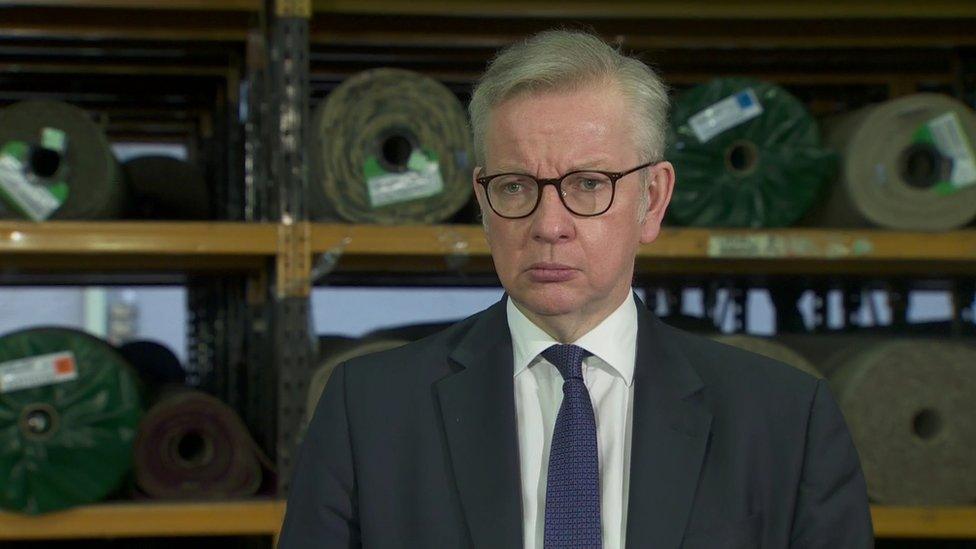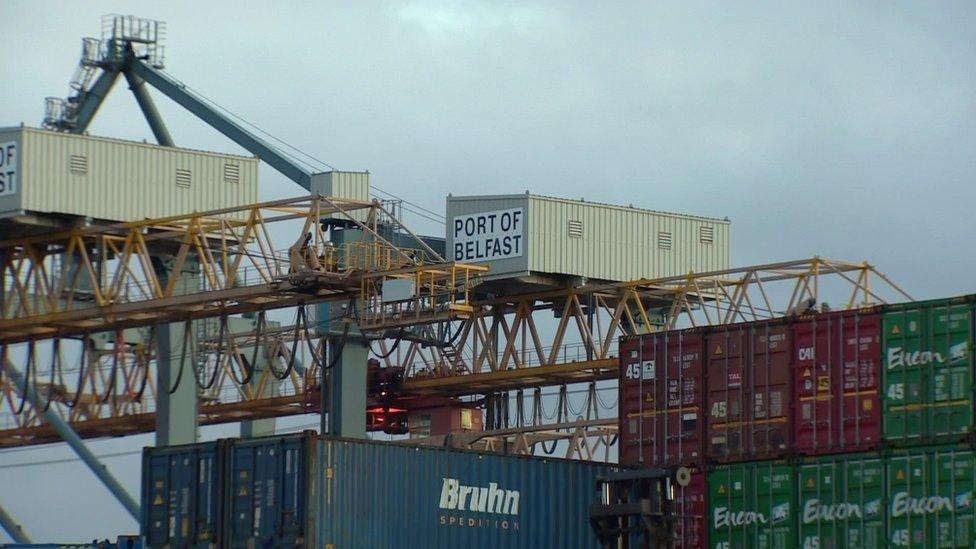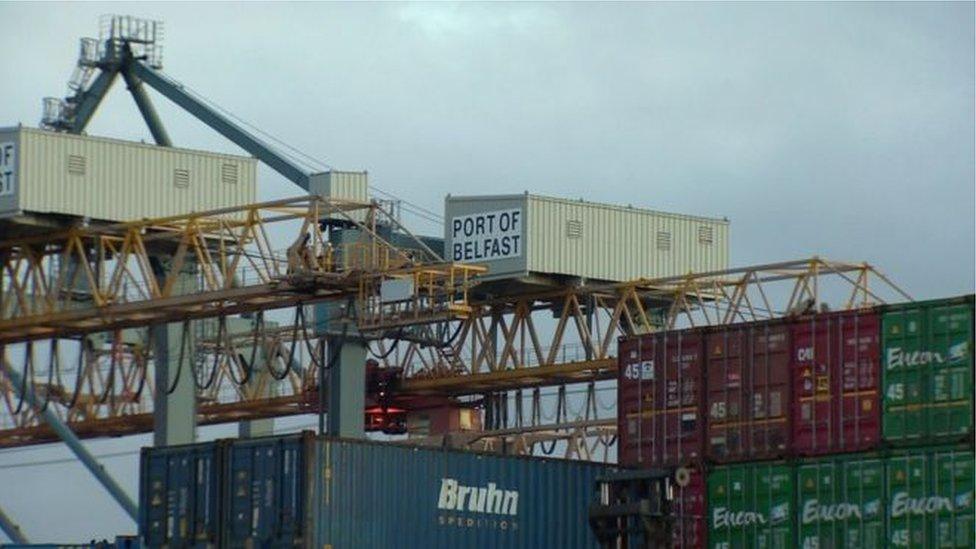Brexit: Government pledges £355m to ease GB-NI trade
- Published
- comments

Northern Ireland is staying in the EU single market for goods at the end of the transition period
The government is to spend up to £355m on a new system for moving goods into Northern Ireland from the rest of the UK.
The system is required as a consequence of the NI part of the Brexit deal.
From 1 January, goods entering NI from GB will need customs declarations.
The Trader Support Service (TSS) will effectively see the government acting as a customs agent on behalf of businesses.
Cabinet Office Minister Michael Gove gave details of the plan on a visit to Portadown, County Armagh, on Friday.
The TSS is due to be up and running in September and will be free to use.
Initially traders will register with the service and receive advice on what Brexit will mean for their business and the next steps they should take.
They will be helped to understand what information they need to collect about the goods they will be importing.
TSS will then use this information to complete import declarations on behalf of importing companies.
It should help to prevent what would have been a significant new administrative burden for many firms.

Mr Gove visited Northern Ireland to outline details of the new plans
Speaking to BBC News NI, Mr Gove said the plans would give NI businesses the "potential to have the best of both worlds".
"Businesses will have guaranteed unfettered access to the rest of the United Kingdom, but it's also the case that we're making sure that there is no border infrastructure on the island of Ireland," he said.
"So Northern Ireland businesses can have access to the European single market."
Mr Gove added: "Sometimes when I'm in Scotland I find that Scottish businesses are jealous of the fact that Northern Ireland businesses have the best of both worlds."
The minister was also asked about the ongoing trade negotiations with the EU, and said he believed they were on course for a "successful outcome".
UK-EU trade negotiations 'making progress'
He said: "I think all the evidence is that we are making progress with the EU but whether or not there is, the UK govt will be ready to ensure that the NI protocol is implemented.
"We will be in a position to take advantage of new free trade agreements and Northern Ireland will be benefitting from those as much as the rest of the UK."
Northern Ireland Secretary Brandon Lewis said the TSS was a unique service that "will ensure that businesses of all sizes can have import processes dealt with on their behalf, at no cost".
However it does not remove all the looming difficulties for GB-NI trade.
For example agri-food products being imported from GB will have to go through an expensive certification process unless a special deal can be reached with the EU.
In its negotiation with EU, the UK government has suggested a 'trusted trader' system for supermarkets when moving their products from GB to NI.
Northern Ireland manufacturers import much of their components and raw materials from GB and have welcomed the TSS plan.

The UK government has said there will be no trade border in the Irish Sea but the EU wants goods checks
Northern Ireland's First Minister Arlene Foster, who held meetings with Mr Gove in Hillsborough Castle on Friday, said she welcomed the additional money - but stressed that questions remain.
"Many points which still require clarity to enable business decisions to be made," said the DUP leader.
"Indeed, there is also a role for the EU to show some flexibility to resolve any remaining concerns and give certainty."
'More still to be done'
Economy Minister Diane Dodds said she wants to see details of the legislation the government has promised on unfettered access for Northern Ireland firms to the UK's internal market.
Asked if what the government was doing pointed to more bureaucracy and costs, she said: "Today is an example of investing in services to try to reduce the impacts of that protocol.
"We need to see the outworkings of all of this but today is an important day - there's been a lot of money announced."
Stephen Kelly, from Manufacturing NI, said: "This commitment to cover customs costs is a very welcome first step but there is more still to be done."
He cited the agri-food issue and VAT as areas where more clarity was needed.
"It remains the case that agreement on the future relationship between the UK and EU will remove many potential existential issues so we hope that there is an increased focus on ensuring success in those negotiation for all our sakes."
Seamus Leheny of the Freight Transport Association also welcomed the news, saying it was "hugely significant".
However he added there were still issues to address around the movement of food and market access.
It is also still not clear what new processes or barriers could apply to Northern Ireland consumers buying goods online from GB suppliers.
Guidance on this "non-freight" trade will have to be provided in the next few months.
Technology investment
A procurement exercise for the TSS has been launched with the government committing £50m for the establishment and first phase of the service, with the full contract worth up to £200m.
A further £155m will be available for technology investment to digitise and streamline the new processes.
At the end of the Brexit transition period on 31 December, Northern Ireland will continue to follow EU rules on agricultural and manufactured goods, while the rest of the UK will not.
Additionally, the whole of the UK will leave the EU's customs union but Northern Ireland will continue to enforce the EU's customs code at its ports.
It is this which will mean new checks and processes for goods moving into Northern Ireland from other parts of the UK.
- Published11 July 2020

- Published7 July 2020

- Published9 July 2020
